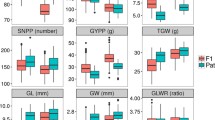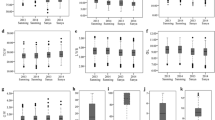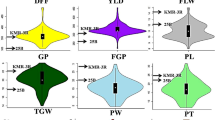Abstract
The linear relationship between genetic distance and heterosis within maize heterotic groups has inspired efforts to predict heterosis using molecular markers in other species. In this study, three cytoplasmic male sterile and three restorer lines from a hybrid rice breeding program were crossed in all possible (9) combinations and the F1 offspring grown in replicated trials in three locations. Whole genome sequence analyses were used to identify hybrid pair genome-wide polymorphisms and the extent to which these polymorphisms were associated with heterosis estimated. The number of total hybrid pair SNP ranged from 150,823 to 331,876 and mid-parent heterosis from −13.6 % to 18.6 %. Hybrid pair total SNP, total INDEL, gene SNP and gene INDEL counts were generally correlated at the whole genome and chromosome level. There was a close correlation between chromosome SNP and INDEL frequencies while gene presence-absence analysis found little difference between cross combinations. The relationship between whole genome SNP and heterosis was best explained by a second order polynomial of negative sign, suggesting a positive heterotic response may be achieved by maintaining a balance between inbreeding and outbreeding depression, and that genome wide polymorphisms may have a role in predicting heterosis in rice.







Similar content being viewed by others
Abbreviations
- CMS:
-
Cytoplasmic male sterile
- SNP:
-
Single nucleotide polymorphism
- Bp:
-
Base pair
- INDEL:
-
Insertion-deletion
- Gb:
-
Gigabase
References
Hua JP, Xing YZ, Xu CG, Sun XL, Yu SB, Zhang Q (2002) Genetic dissection of an elite rice hybrid revealed that heterozygotes are not always advantageous for performance. Genetics 162:1885–1895
Hua J, Xing YW, Xu C, Sun X, Yu S, Zhang Q (2003) Single-locus heterotic effects and dominance by dominance interactions can adequately explain the genetic basis of heterosis in an elite rice hybrid. Proc Natl Acad Sci U S A 100:2574–2579
Huang X, Yang S, Gong J, Zhao Y, Feng Q, Gong H, Li W, Zhan Q, Cheng B, Xia J, Chen N, Hao Z, Liu K, Zhu C, Huang T, Zhao Q, Zhang L, Fan D, Zhou C, Lu Y, Weng Q, Wang ZX, Li J, Han B (2015) Genomic analysis of hybrid rice varieties reveals numerous superior alleles that contribute to heterosis. Nat Commun 6:6258
Kennedy G, Burlingame B (2003) Analysis of food composition data on rice from a plant genetic resources perspective. Food Chem 80:589–596
Kent WJ (2002) BLAT - the BLAST-like alignment tool. Genome Res 124:656–664
Langmead B, Salzberg S (2012) Fast gapped-read alignment with Bowtie 2. Nat Methods 9:357–359
Li ZK, Luo LJ, Mei HW, Wang DL, Shu QY, Tabien R, Zhong DB, Ying CS, Stansel JW, Khush GS, Paterson AH (2001) Overdominant epistatic loci are the primary genetic basis of inbreeding depression and heterosis in rice I Biomass and grain yield. Genetics 158:1737–1753
Lin SC, Yuan LP (1980) Hybrid rice breeding in China In: Innovative approaches to rice breeding. Selected papers from the 1979. International Rice Research Conference, Manila Philippines
Liu XC, Chen SG, Chen JS, Ishiki KS, Wang WX, Yu LQ (2004) Improvement of combining ability for restorer lines with the identified SSR markers in hybrid rice breeding. Breed Sci 544:341–346
Luo LJ, Li ZK, Mei HW, Shu QY, Tabien R, Zhong DB, Ying CS, Stansel JW, Khush GS, Paterson AH (2001) Overdominant epistatic loci are the primary genetic basis of inbreeding depression and heterosis in rice II Grain yield components. Genetics 158:1755–1771
Melchinger AE, Lee M, Lamkey KR, Woodman WL (1990) Genetic diversity for restriction fragment length polymorphisms and its relationship to genetic effects estimated from generation means in four sets of maize inbreds. Crop Sci 30:1033–1040
Reif JC, Melchinger AE, Xia XC, Warburton ML, Hoisington DA, Vasal SK, Srinivasan G, Bohn M, Frisch M (2003) Genetic distance based on simple sequence repeats and heterosis in tropical maize populations. Crop Sci 43:1275–1282
Renming Z, Yinghua L, Zhenglin Y, Fangming Z, Bingqiang Z, Rong X, Xianchun S, Guanghua H (2008) Prediction of hybrid grain yield performances in indica rice (Oryza sativa L) with effect-increasing loci. Mol Breed 22:467–476
Saghai Maroof MA, Yang GP, Zhang Q, Gravois KA (1997) Correlation between molecular marker distance and hybrid performance in U S southern long grain rice. Crop Sci 37:145–150
Springer NM, Ying K, Fu Y, Ji T, Yeh C-T, Jia Y, Wu W, Richmond T, Kitzman J, Rosenbaum H, Iniguez AL, Barbazuk WB, Jeddeloh JA, Nettleton D, Schnable PS (2009) Maize inbreds exhibit high levels of copy number variation (CNV) and presence/absence variation (PAV) in genome content. PLoS Genet 5(11):e1000734
Subbaiyan GK, Waters DLE, Katiyar SK, Sadananda AR, Satyadev V, Henry RJ (2012) Genome-wide DNA polymorphisms in elite indica rice inbreds discovered by whole-genome sequencing. Plant Biotechnol J 10:623–634
Subbaiyan GK, Waters DLE, Henry RJ (2014) A method for discovery of genome-wide SNP between any two genotypes from whole genome re-sequencing data In: Henry RJ and Furtado A Eds Cereal Genomics: Methods and Protocols. Methods Mol Bio, Springer, New York USA, pp. 287–294
Troyer AF (1996) Breeding widely adapted popular maize hybrids. Euphytica 92:163–174
Virmani SS (2003) Advances in hybrid rice research and development in the tropics. In: Virmani SS, Mao CX, Hardy B (eds) Hybrid rice for food security poverty alleviation and environmental protection. Proceedings of the 4th International Symposium on hybrid rice, Hanoi
Virmani SS, Kumar I (2004) Development and use of hybrid rice technology to increase rice productivity in the tropics. Int Rice Res Notes 29:10–19
Xiao J, Li J, Yuan L, Tanksley SD (1995) Dominance is the major genetic basis of heterosis in rice as revealed by QTL analysis using molecular markers. Genetics 140:745–754
Xiao J, Li J, Yuan L, McCouch SR, Tanksley SD (1996) Genetic diversity and its relationships to hybrid performance and heterosis in rice as revealed by PCR-based markers. Theor Appl Genet 92:637–643
Xu S, Zhu D, Zhang Q (2014) Predicting hybrid performance in rice using genomic best linear unbiased prediction. Proc Natl Acad Sci U S A 111:12456–12461
Yu SB, Li JX, Xu CG, Tan YF, Gao YJ, Li XH, Zhang Q, Saghai Maroof MA (1997) Importance of epistasis as the genetic basis of heterosis in an elite rice hybrid. P Natl Acad Sci USA 94:9226–9231
Zhang Q, Gao YJ, Yang SH, Ragab R, Saghai Maroof MA, Li ZB (1994) A diallel analysis of heterosis in elite hybrid rice based on RFLPs and microsatellites. Theor Appl Genet 89:185–192
Zhang QF, Gao YJ, Yang SH, Saghai Maroof MA, Li JN (1995) Molecular divergence and hybrid performance in rice. Mol Breed 1:133–142
Zhang Q, Zhou ZQ, Yang GP, Xu CG, Liu KD, Saghai Maroof MA (1996) Molecular marker heterozygosity and hybrid performance in indica and japonica rice. Theor Appl Genet 93:1218–1224
Zhou G, Chen Y, Yao W, Zhang C, Xie W, Hua J, Xing Y, Xiao J, Zhang Q (2012) Genetic composition of yield heterosis in an elite rice hybrid. Proc Natl Acad Sci U S A 109:15847–15852
Acknowledgments
We thank the Australian Research Council and Advanta India for financial support. GKS was supported by a BOYSCAST Fellowship.
Author information
Authors and Affiliations
Corresponding author
Ethics declarations
Conflict of interest
The authors declare no conflict of interest.
Additional information
Communicated by: Ray Ming
Rights and permissions
About this article
Cite this article
Waters, D.L.E., Subbaiyan, G.K., Mani, E. et al. Genome wide polymorphisms and yield heterosis in rice (Oryza sativa subsp. indica). Tropical Plant Biol. 8, 117–125 (2015). https://doi.org/10.1007/s12042-015-9156-x
Received:
Accepted:
Published:
Issue Date:
DOI: https://doi.org/10.1007/s12042-015-9156-x




